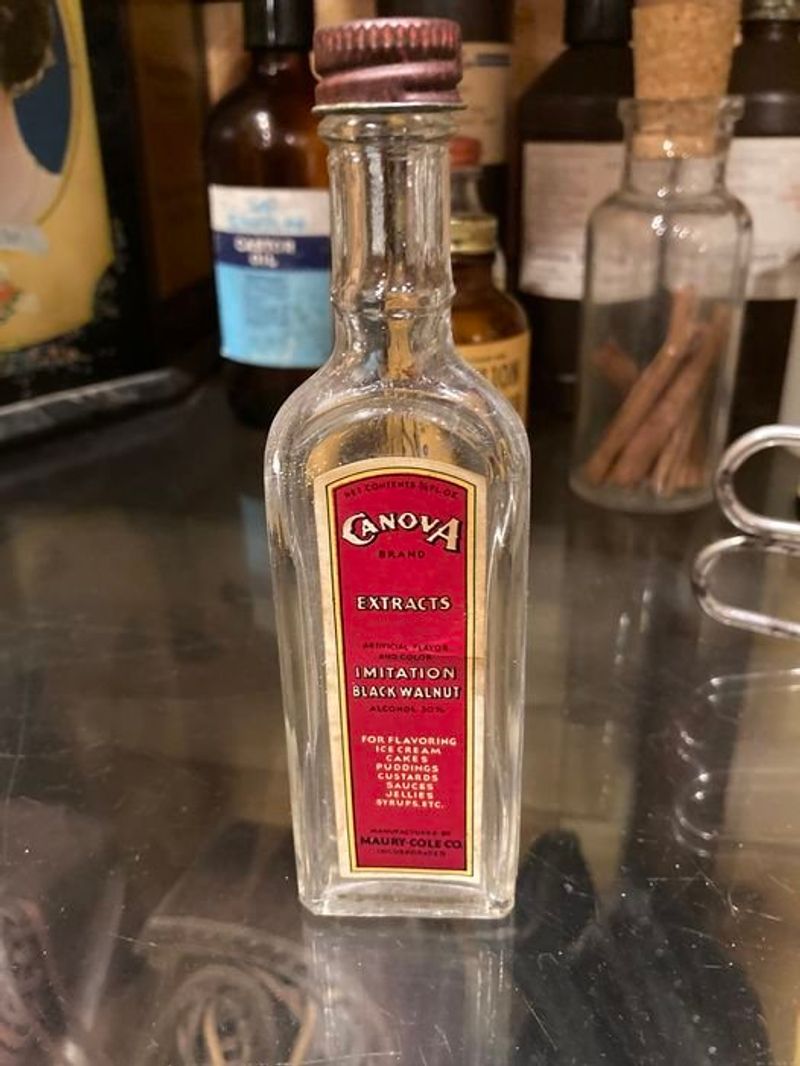- Posts
IMITATION BLACK WALNUT EXTRACT
Last Updated 12/29/2023
By ESTHER NUNLEY

Original Publish Date: December 22, 2022
The holiday season has us reaching for our flavored extracts as we recreate some of our family recipes that are passed down through the years. One of those vintage flavors is that of Black Walnut. A small bottle that once held Imitation Black Walnut flavored extract is on the shelf in the general store exhibit of the McMinn County Living Heritage Museum.
The early settlers found an abundance of wild Black Walnut trees as they settled across the country. The tree became a valuable resource for many uses including the rich flavor of black walnut in their cakes, breads, sauces, syrups, and more. It is written that Meriwether Lewis and William Clark, the 19th century explorers of the west, were known to eat honey Black Walnut bread. The nut gives a flavor much richer than the English walnut cultivated and grown in orchards and marketed in our grocery stores today.
The imitation flavors were being produced at the turn of the 20th century by many grocery suppliers. Our small bottle is believed to be early 1900s. There are two main reasons why; one is because it is a flavor always being produced in bulk, and the other is it is less expensive to make when the ingredients are in bulk purchases. The artificial flavoring is made from synthetics that mimic the taste of the natural ingredient. The FDA has ensured that these additives are safe to consume.
The wild black walnut is native to 32 states and is the official tree nut of Missouri where black walnuts are found in abundance. It is the only wild tree nut in the U.S. The most valuable and fully utilized forest tree in North America. The nuts harvested from this tree contain the highest protein of any other nut. They are harvested in late September through early October, by hand as they fall to the ground.
The tree itself grows straight with low branches that stretch out wide as if to allow the nuts to be easily harvested and because of this it makes a great shade tree.
The fruit, leaves and roots contain a chemical called Juglone which is toxic and doesn’t allow other plants to grow near it. The shell of the nut is protected by a hull which requires a process of safe handling before the actual meat of the nut is ready to be eaten. Gloves are recommended when harvesting wild black walnuts.
The wood is used for furniture and gun stocks. The husks are used to make dyes and the shells, the hardest of any tree nut in the world, are used in industrial applications. The U.S. Navy has used the shell to clean naval war ships and submarines. Black Walnut shells were used to clean the Statue of Liberty and have been used as a filler in dynamite.
Evidence shows that the Native Americans enjoyed the uses of this tree. Earlier settlers found the wood resistant to rot and used it for fences, shingles, and sills.
Writing ink was made and is still made from the hulls of the nut which is the reason why a lot of our historic documents give a faded appearance. A lot of our history is written in black walnut ink! Artists enjoy creating with the ink and appreciate the vintage ancestorial connection of the resource.
Black Walnut extract can be made at home by infusing the flavor in alcohol. Recipes can be looked up online for the approximately two-month long process. The natural form of the extract can be found at health food stores or through on-line ordering. It is an herbal supplement with some health benefits and is also believed to reduce inflammation.
Our small bottle holds ¾ ounce of the extract. It is a Canova Brand extract manufactured by Maury-Cole Company; a Memphis based firm that was better known for their roasting of the popular Canova Brand Coffee. Founded in 1909 by Joseph E. Maury (b. 1872, d. 1952), J. K. Cole (b. 1855, d. 1930), and Wm T. Tyson (b. 1883, d. 1972). They were refiners and canners of molasses and syrups, importers and roasters of coffee and tea, and manufacturers of fine flavoring extracts.
By 1937 Maury helped reorganize the company into Canova Foods Incorporated. Canova Foods was later absorbed into the Oliver-Finnie Company, another Memphis based grocery wholesaler established in 1860, closing its doors in 1961.

